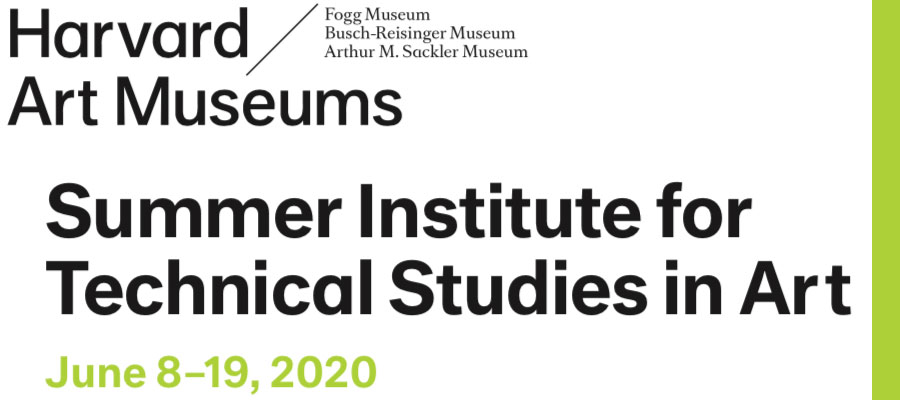2020 Summer Institute for Technical Studies in Art, Harvard Art Museums, June 8–19, 2020
The Summer Institute for Technical Studies in Art (SITSA) is an intensive two-week workshop for a cohort of 15 Ph.D. candidates in art history from diverse backgrounds and research areas who will benefit from experience with object-based and art-technical investigations.
The course aims to expose participants to the interdisciplinary approach and tools that are core to such technical studies while fostering relationships that further collaboration, enrich research, and enhance scholarship across the field of art history and beyond. Participants will engage in close looking, art making, and scientific investigation of works of art with conservators, conservation scientists, curators, art historians, artists, and other experts, under the direction of Francesca Bewer, Research Curator for Conservation and Technical Studies Programs. Students will also engage in peer-to-peer teaching, discuss technical art history writing, and formulate questions throughout the workshop. Together, the cohort will explore ways in which the skills and knowledge they acquire during the course can meaningfully contribute to their research, be applied in teaching, and be communicated with diverse museum audiences.
SITSA builds on the strong relationship between the Harvard Art Museums’ conservation, curatorial, and education departments and academic partnerships across campus. The workshop will take place in the interdisciplinary, collaborative environment of the Harvard Art Museums and benefit from resources of the neighboring Department of History of Art and Architecture as well as other academic and cultural venues in the greater Boston area.
The workshop is generously funded by the Andrew W. Mellon Foundation. Each participant will be provided with housing and a stipend of $1,500 to help cover roundtrip travel costs, food, and incidental expenses for the duration of the program.
Course Topic: Replication
There is a long history of artists and craftspeople creating copies or multiples of their work, producing artworks that are themselves multiples, and incorporating reproduction(s) into original works. Familiarization with instruments and materials of one’s craft to hone skills entails repetition of gestures. Copying others’ works and artistic processes is also a time-honored practice: for some, it is an act of devotion; for others, it is adopted for greater dissemination or to serve remunerative ends.
The life of an artwork may also involve replication at various stages. Archaeologists and art conservators, for instance, attempt to replicate objects to better understand artists’ working processes, the evolution of technologies, and how particular works change over time. Increasingly, art historians are applying such hands-on methodology as well. Through the theme of replication, SITSA will consider authenticity, originality, reproducibility, appropriation, and multiples.
Guided by experts, participants will consider theoretical and practical questions about replication. They might consider the limits and possibilities of research into replication (by art historians, artists, scientists, conservators, craftspeople) and what more could be learned from other disciplines. They might also investigate what kinds of new knowledge digital imaging and analytical technologies can provide. Participants will be introduced to the tools used routinely in conservation to gather evidence of manufacture, alteration, and restoration and will carry out in-depth examination and documentation of selected objects from the museums’ collections. Bronze casting, printmaking, analog photographic printing, and reconstruction of a historical oil painting are among the hands-on processes that will be attempted, in combination with close looking at works and conversations with artists.
Eligibility
Art history students currently enrolled in or completing a doctoral program in North America are eligible to apply. No background in science or conservation is required, and any specialization is welcome. A maximum of 15 participants will be admitted to the program. Applicants will be evaluated on the basis of their expressed interest in integrating technical studies in their own scholarly pursuits and in the field more broadly and their academic accomplishments to date.
